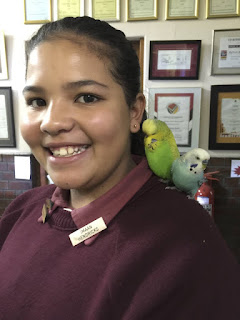 I am sitting and
reflecting on the title of Athol Williams' autobiography. Athol is an uncle of two pupils at our school, and he has recently been collaborating with staff and pupils, particularly in writing poetry.
I am sitting and
reflecting on the title of Athol Williams' autobiography. Athol is an uncle of two pupils at our school, and he has recently been collaborating with staff and pupils, particularly in writing poetry. Leading a school over the past twenty years has involved many boulders; from pushing them over the hill, to going around them or climbing over them. Education in South Africa is not for the feint hearted! If you want to provide the very best education to as many of South Africa's children as possible, the odds are stacked against you! Not only because of finance and funding issues, but also the belief by many citizens today that the right to education does not come with any responsibilities. An admission denial, for example, is seen as a personal affront, and is very often taken to education officials, including the Minister of Education. Luckily these admission appeals are taken seriously and, because our school always follows the rules regarding admissions, we have never been told to accept any child we have previously turned away.
Other
'boulders' besides admissions are assessment criteria changing annually,
overloaded curriculum requirements, personal family problems spilling over into
unreasonable demands or anger against teachers or the school, and a lack of support from
departmental officials when 'the chips are down'!
One positive thing about facing all these
boulders over the years, is that boulders make you stronger and braver every
time you overcome one! This means that I am much braver today than I was in
1997. Principalship requires huge bravery because one is often left standing
alone....either by parents, officials or staff. If this happens today, I know
it is temporary and as long as I keep focussed on the goal and the children's
best interests, the boulder will eventually be surmounted. In years gone by I
would have 'sweated' about the boulder and often blamed myself
for the boulder being in the way of progress.
I will never be arrogant
about overcoming school boulders - each boulder needs to be treated as
important, to be dissected until the very best outcome can be achieved for everybody concerned. Boulders make us stronger as human beings, they make us value the calm and
quiet times in between boulders. So, consider every boulder as an opportunity
to become braver, as a gift or opportunity to rethink the things you stand
for....you certainly will be stronger afterwards!










